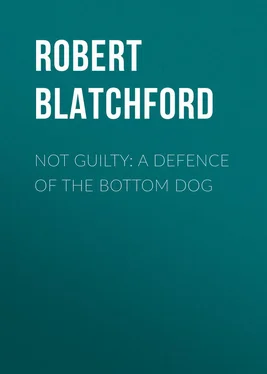Robert Blatchford - Not Guilty - A Defence of the Bottom Dog
Здесь есть возможность читать онлайн «Robert Blatchford - Not Guilty - A Defence of the Bottom Dog» — ознакомительный отрывок электронной книги совершенно бесплатно, а после прочтения отрывка купить полную версию. В некоторых случаях можно слушать аудио, скачать через торрент в формате fb2 и присутствует краткое содержание. Жанр: foreign_antique, foreign_prose, на английском языке. Описание произведения, (предисловие) а так же отзывы посетителей доступны на портале библиотеки ЛибКат.
- Название:Not Guilty: A Defence of the Bottom Dog
- Автор:
- Жанр:
- Год:неизвестен
- ISBN:нет данных
- Рейтинг книги:3 / 5. Голосов: 1
-
Избранное:Добавить в избранное
- Отзывы:
-
Ваша оценка:
- 60
- 1
- 2
- 3
- 4
- 5
Not Guilty: A Defence of the Bottom Dog: краткое содержание, описание и аннотация
Предлагаем к чтению аннотацию, описание, краткое содержание или предисловие (зависит от того, что написал сам автор книги «Not Guilty: A Defence of the Bottom Dog»). Если вы не нашли необходимую информацию о книге — напишите в комментариях, мы постараемся отыскать её.
Not Guilty: A Defence of the Bottom Dog — читать онлайн ознакомительный отрывок
Ниже представлен текст книги, разбитый по страницам. Система сохранения места последней прочитанной страницы, позволяет с удобством читать онлайн бесплатно книгу «Not Guilty: A Defence of the Bottom Dog», без необходимости каждый раз заново искать на чём Вы остановились. Поставьте закладку, и сможете в любой момент перейти на страницу, на которой закончили чтение.
Интервал:
Закладка:
We speak of these mixed natures which a man inherits from his fore-parents as his "disposition": we call them "the qualities of his mind," and we wonder when we find him inconsistent, changeable, undecided. Ought we to be surprised that the continual struggle for the mastery amongst so many alien natures leads to unlooked-for and unwished-for results?
Take the case of a council, a cabinet, a regiment, composed of antagonistic natures; what happens? There are disputes, confusion, contradictions, cross-purposes. Well: a man is like a crowd, a Parliament, a camp of ill-matched foreign allies. Indeed, he is a crowd – a crowd of alien and ill-sorted ancestors.
The Great Arteries of Human Nature
But, differ from each other as we may, there are some general qualities – some human qualities – common to most of us.
These common qualities may be split into two kinds, selfish and unselfish.
The selfish instincts come down to us from our earlier brute ancestors.
The unselfish instincts come down to us from our later brute ancestors, and from our human ancestors.
Amongst the strongest and the deepest of man's instincts are love of woman, love of children, love of pleasure, love of art, love of humanity, love of adventure, and love of praise.
I should say that the commonest and most lasting of all human passions is the love of praise: called by some "love of approbation."
From this great trunk impulse there spring many branches. Nearly all our vanities, ambitions, affectations, covetings, are born of our thirst for praise. It is largely in the hope of exciting the wonder or the admiration of our fellows that we toil and scramble and snatch and fight, for wealth, for power, for place; for masterly or daring achievement.
None but misers love money for its own sake. It is for what money will buy that men covet it; and the most desired of the things money will buy are power and display: the value of which lies in the astonishment they will create, and the flattery they will win.
How much meaning would remain to such proud and potent words as glory, riches, conquest, fame, hero, triumph, splendour, if they were bereft of the glamour of human wonder and applause?
What man will bear and do and suffer for love of woman, and woman for love of man; what both will sacrifice for the sake of their children; how the devotee of art and science, literature, or war, will cleave to the work of his choice; with what eagerness the adventurer will follow his darling bent, seeking in the ends of the earth for excitement, happy to gaze once more into the "bright eyes of danger"; with what cheerful steadfastness and unwearied self-denial benevolence will labour for the good of the race; is known to us all. What we should remember is that these and other powers of our nature act and react upon each other: that one impulse checks, or goads, or diverts another.
Thus the love of our fellows will often check or turn aside our love of ourselves. Often when the desire for praise beckons us the dread of blame calls us back again. The love of praise may even lure us towards an act, and baulk us of its performance: as when a cricketer sacrifices the applause of the crowd in order to win the praise of captain or critics.
So will the lust of pleasure struggle against the lust of fame; the love of woman against the love of art; the passion for adventure against the desire for wealth; and the victory will be to the stronger.
Let us look into the human heart (the best way is to look into our own) and see how these inherited qualities work for and against each other.
One of the strongest checks is fear; another is what we call conscience.
Fear springs sometimes from "love of approbation"; we shrink from an act from fear of being found out, which would mean the loss of that esteem we so prize. Or we shrink from fear of bodily pain: as those knew well who invented the terrors of hell-fire.
There is a great deal of most respectable virtue that ought to be called cowardice. Deprive virtue of its "dare nots," and how many "would nots" and "should nots" might survive? Good conduct may not mean the presence of virtue, but the lack of courage, or desire.
But, happily, men do right, also, for right's sake; and because it is right; or they refrain from doing wrong because it is wrong.
The bent towards right conduct arises from one of two sources:
1. Education: we have been taught that certain acts are wrong.
2. Natural benevolence: a dislike to injure others.
The first of these – education – has to do with "environment"; the second is part of heredity. One we get from our fellow-men, the other from our ancestors.
Here let us pause to look into that much-preached-of "mystery" of the "dual consciousness," or "double-self."
We all know that men often do things which they know to be wrong. When we halt between the desire to do a thing, and the feeling that we ought not to do it, we seem to have two minds within us, and these two minds dispute about the decision.
What is this "mysterious" double-self? It is nothing but the contest between heredity and environment; and is not mysterious at all.
Heredity is very old. It reaches back, to the beasts. It passes on to us, generation after generation, for millions of years, certain instincts, impulses, or desires of the beast.
Environment is new. It begins at the cradle. It prints upon us certain lessons of right and wrong. It tells us that we ought not to do certain things.
But the desire to do those things is part of our heredity. It is in our blood. It is persistent, turbulent, powerful. It rises up suddenly, with a glare and a snarl, like a wild beast in its lair. And at the sound of its roar, and the flame of its lambent eyes, and the feel of its fiery breath, memory lifts its voice and hand, and repeats the well-learned lesson with its "shall-nots."
We are told that the animal impulses dwell in the "hind brain," and that morals and thought dwell in the "fore brain." The "dual personality," then, the "double-self," consists of the two halves of the brain; and the dispute between passion and reason, or between desire and morality, is a conflict between the lower man and the higher; between the old Adam and the new.
But it is also, to a great extent, a conflict between the average man and the hero, or leader.
We inherit the roots of morality, that is ta say, the "social instincts," or impulses of unselfish thoughts for others, from the sociable animals. But what we call "ethics," the rules or laws of moral conduct, have been slowly built up by human teachers. These teachers have been men with a special genius for morals. They have made codes of morals higher than the nature of the average man can reach.
But the average man has been taught these codes of morals in his childhood, and has grown up in unquestioning respect for them.
So when his baser nature prompts him to an act, and his memory repeats the moral lesson it has learnt, we have the nature of the average man confronted by the teaching of the superior or more highly moral man.
And there is naturally a conflict between the desire to do evil, and the knowledge of what things are good. It is not easy for Wat Tyler, Corporal Trim, or Sir John Falstaff to follow the moral lines laid down by such men as Buddha, Seneca, or Socrates. Sir John knows the value of temperance; but he has a potent love of sack. Wat knows that it is good for a man to govern his temper; but he is a choleric subject, and "hefty" with a hammer. There was a lot of human nature in the shipwright, who being reminded that St. Paul said a man was better single, retorted that "St. Paul wasn't a North Shields man."
We know very well that some qualities may make either for good or bad. Strength, ability, courage, emulation, may go to the making of a great hero, or a great criminal..
Читать дальшеИнтервал:
Закладка:
Похожие книги на «Not Guilty: A Defence of the Bottom Dog»
Представляем Вашему вниманию похожие книги на «Not Guilty: A Defence of the Bottom Dog» списком для выбора. Мы отобрали схожую по названию и смыслу литературу в надежде предоставить читателям больше вариантов отыскать новые, интересные, ещё непрочитанные произведения.
Обсуждение, отзывы о книге «Not Guilty: A Defence of the Bottom Dog» и просто собственные мнения читателей. Оставьте ваши комментарии, напишите, что Вы думаете о произведении, его смысле или главных героях. Укажите что конкретно понравилось, а что нет, и почему Вы так считаете.












